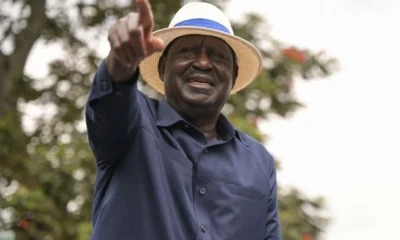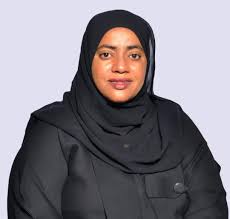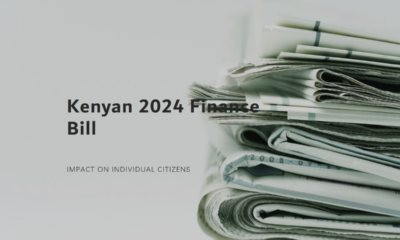The Entrepreneur
Suss Ads’ Strategic Expansion: From Kenyan Powerhouse to Pan-African Leader
Suss Ads aims to capture market share by offering tailored, data-driven marketing solutions rather than traditional blanket campaigns. This approach is particularly suited to regions with diverse audiences
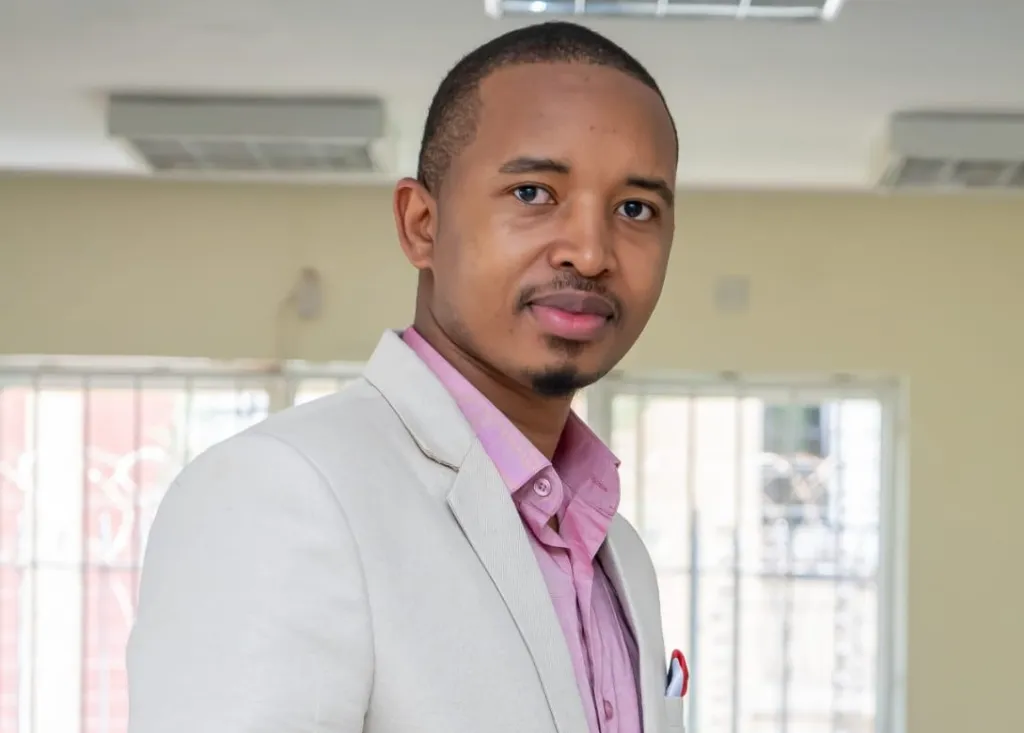
:Dennis Maina, founder of Suss Ads, leads the company’s expansion across East Africa, South Africa, and Nigeria, driving innovation in Africa’s digital advertising landscape.
By Charles Wachira
Dennis Maina, 34, is the visionary founder and CEO of Suss Ads, a digital advertising powerhouse in Kenya established in 2015. At the time, the digital advertising market in “Silicon Savannah” was still in its early stages.
Armed with a background in computer science and a passion for digital marketing, Maina saw an opportunity to bridge the gap between businesses and their target audiences through innovative advertising solutions.
Company Growth and Market Valuation
Since its inception, Suss Ads has grown significantly in size and market influence. The company started with a small team of dedicated professionals with a mission to empower businesses through effective digital marketing strategies.
As of 2024, Suss Ads boasts an annual revenue of approximately $10 million and a consistent growth rate of 20% year-over-year.
The company’s valuation is estimated to be between $50 million and $70 million, thanks to its robust client portfolio, diversified service offerings, and leading position in the Kenyan digital advertising market.
Ambitious Regional Expansion
On June 20, Dennis Maina announced Suss Ads’ plans for an ambitious regional expansion across East Africa, South Africa, and Nigeria to capitalise on opportunities in Africa’s burgeoning advertising sector.
Maina detailed that Suss Ads would begin its expansion within East Africa, targeting Uganda, Rwanda, Tanzania, and Ethiopia by the end of 2024.
Following this, the company has already started making inroads into South Africa and Nigeria in 2024, with plans to continue through 2025.
This expansion will involve establishing offices, hiring local talent, and collaborating with established advertising entities.
The timing of this expansion is strategic, as Africa’s digital advertising market is projected to grow to $16.5 billion by 2026, up from $9 billion in the previous year, according to research firm Statista.
South Africa and Nigeria are already among the continent’s largest markets, with Kenya’s market estimated at $145 million last year.
Innovative Services and Technologies
Suss Ads aims to capture market share by offering tailored, data-driven marketing solutions rather than traditional blanket campaigns. This approach is particularly suited to regions with diverse audiences.
The agency also plans to incorporate cutting-edge technologies such as augmented and virtual reality to enhance client engagement in the real estate, gaming, and education sectors.
“Standing out in this highly competitive space requires constant innovation,” Maina said. “We see our strategic use of new media and data analytics as key differentiators.”
Industry analysts agree that Suss Ads’ regional ambitions are strategically sound, given the scalability of its platform-based model.
However, successfully penetrating new markets requires agile operations and strong local partnerships.
Comprehensive Suite of Services
Suss Ads offers a comprehensive suite of digital advertising services tailored to meet each client’s unique needs. These services include:
- Search Engine Optimisation (SEO): Advanced SEO techniques to enhance online visibility and ensure higher rankings on search engine results pages (SERPs).
- Pay-Per-Click (PPC) Advertising: Design and manage PPC campaigns to drive targeted traffic and optimise ad spending for maximum ROI.
- Social Media Marketing: Leveraging platforms like Facebook, Instagram, and Twitter to create engaging content and manage campaigns that boost brand awareness and customer engagement.
- Content Marketing: Creating compelling and relevant content to establish authority, attract potential customers, and retain existing ones.
- Web Design and Development: Providing end-to-end web design and development services to create user-friendly and aesthetically pleasing websites.
- Email Marketing: Developing targeted email campaigns to nurture leads, promote products or services, and drive conversions.
Client Portfolio
Over the years, Suss Ads has built an impressive portfolio of clients across various industries. Notable clients include:
- Safaricom: Kenya’s leading telecommunications company, partnering for high-profile digital marketing campaigns.
- Equity Bank: Enhancing online presence and developing digital marketing strategies for new product launches.
- Kenya Airways: Providing SEO and PPC services to attract international travellers and increase bookings.
- Jumia Kenya: Leveraging content marketing and social media advertising expertise to drive traffic and sales.
- KCB Group: Collaborating on digital initiatives, including web development projects and targeted marketing campaigns.
Dennis Maina: The Visionary Leader
Dennis Maina’s journey has been marked by his steadfast devotion to education, his unwavering commitment to excellence, and the inspiration he draws from role models.
In 2012, he received his bachelor’s degree in computer science from the University of Nairobi. Inspired by leaders such as Steve Jobs, Aliko Dangote, and Sophia Bekele, Maina credits his success to perseverance, a love of innovation, a solid team, a customer-focused mindset, and never giving up.
Conclusion
Dennis Maina’s story is a testament to the power of vision, determination, and proper support. Through Suss Ads, he has built a successful business and significantly contributed to the growth of Kenya’s digital economy.
As Suss Ads embarks on its regional expansion, it is poised to become a leading player in Africa’s digital advertising landscape, inspiring aspiring entrepreneurs along the way.
Keywords:Dennis Maina:Suss Ads Kenya:Digital advertising in Africa:Regional expansion East Africa:Innovative marketing solutions
She Business
Bethlehem Tilahun Alemu: From Ethiopian Artisan to Global Icon

: Discover how Bethlehem Tilahun Alemu built SoleRebels into a global,
sustainable footwear brand, overcoming challenges and transforming Ethiopian
craftsmanship.
Bethlehem Tilahun Alemu’s story begins in Zenabwork, a modest village on the outskirts
of Addis Ababa, Ethiopia. Growing up, she watched her community struggle with unemployment and poverty, despite a rich heritage of artisanal skills that remained largely untapped.
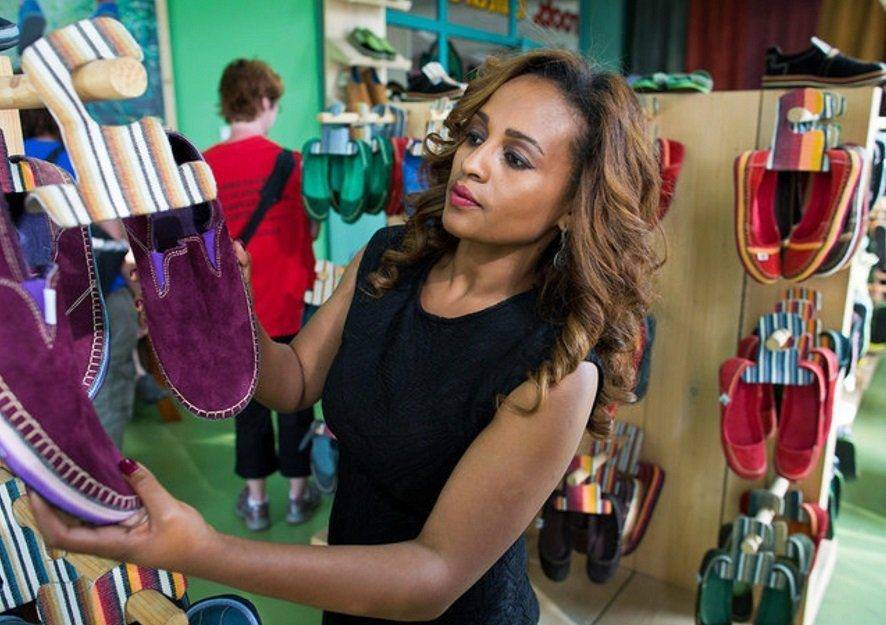
Fueled by determination and a desire to transform her surroundings, Bethlehem
embarked on a journey that would redefine African entrepreneurship and put Ethiopia
on the global map.
Her creation, SoleRebels, isn’t just a footwear brand. It’s a movement—an embodiment
of sustainability, culture, and empowerment.
A DREAM WOVEN WITH TRADITION
In 2005, Bethlehem founded SoleRebels with a simple yet powerful idea: to turn
Ethiopia’s rich artisanal craftsmanship into eco-friendly, globally competitive footwear.
Inspired by traditional “selate” shoes—made from recycled tyres—she envisioned a
brand that blended cultural authenticity with modern design.
She recruited local artisans, many of whom were unemployed, and encouraged them to
innovate while preserving traditional techniques.
Every pair of shoes was a masterpiece, crafted from hand-spun cotton, organic
materials, and repurposed car tyres. Bethlehem’s concept was groundbreaking: a product that told a story while making a global impact.
STARTING FROM SCRATCH
Like many entrepreneurs, Bethlehem’s initial challenge was capital.
With no access to bank loans or large investors, she relied on personal savings and
modest contributions from her family.
Slowly but surely, she built her business, reinvesting profits into training workers and
improving production tools. International grants and initiatives like the SEED Initiative later recognized the potential of her venture, providing additional support.

The early days weren’t easy. Artisans lacked modern tools, and accessing raw
materials was an uphill battle. But Bethlehem, known for her tenacity, tackled these challenges head-on. She developed partnerships with local suppliers to ensure a consistent supply of quality materials and invested in upskilling her workforce.
Breaking into the global market presented another hurdle. Competing against established brands seemed daunting, but Bethlehem found her edge: sustainability and ethical production.
In an era when consumers were becoming eco-conscious, SoleRebels’ ethos of fair wages, recycled materials, and cultural storytelling resonated deeply.
BUILDING A GLOBAL EMPIRE
Fast forward to today, and SoleRebels has a presence in over 30 countries, with
flagship stores in cities like San Francisco, Tokyo, and Barcelona.
It is also the first African footwear brand to be certified by the World Fair Trade
Organization (WFTO)—a testament to Bethlehem’s commitment to doing business the
right way.
Her company directly and indirectly employs over 1,200 people, making it one of
Ethiopia’s largest employers in the artisan sector.
Workers earn more than three times the industry average, a policy Bethlehem takes
immense pride in. “When we pay people well, we don’t just change lives—we transform
communities,” she says.
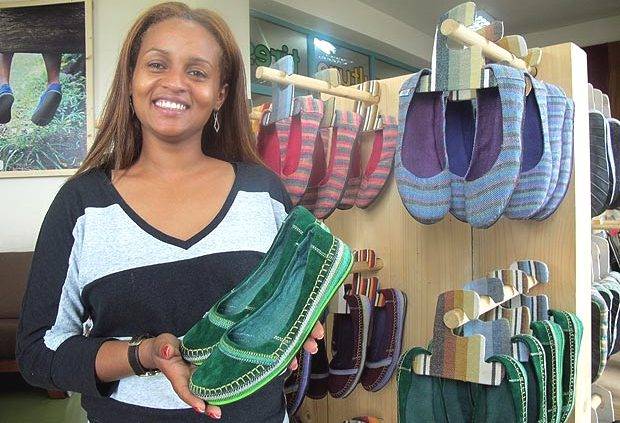
MENTORS AND INSPIRATIONS
Bethlehem often credits her late grandfather, a farmer and community leader, as her
greatest mentor.
His work ethic and deep belief in the power of local communities shaped her vision. She
also draws inspiration from global leaders, including Ethiopian Prime Minister Abiy
Ahmed, whose focus on innovation and economic growth aligns with her goals.
RISING ABOVE CHALLENGES
Bethlehem’s entrepreneurial journey has been marked by resilience. When production
scaled up, she faced supply chain disruptions that threatened deadlines. Her solution?
Cultivate long-term relationships with reliable local suppliers and diversify material
sources.
Entering new markets came with its own set of obstacles. Competing against
established brands requires a unique value proposition.
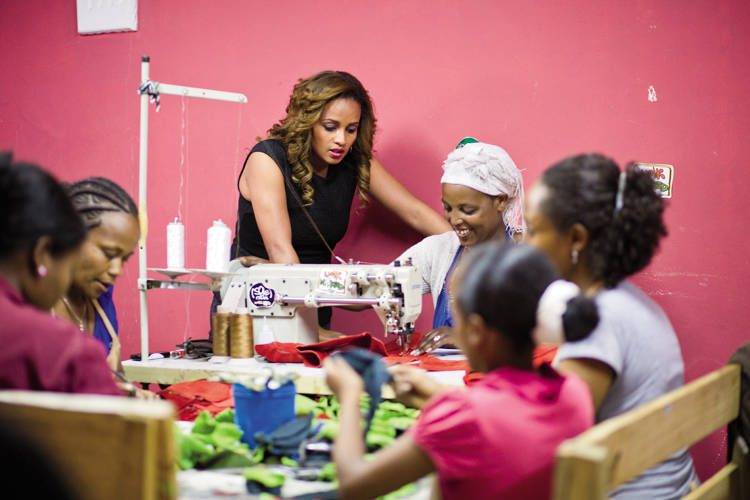
SoleRebels offered more than shoes—it offered a story: a product steeped in Ethiopian
culture, made sustainably, and crafted ethically.
VISION FOR THE FUTURE
Bethlehem isn’t slowing down. Her plans include:
- ● Expanding SoleRebels’ retail presence in Europe and Asia.
- ● Introducing sustainable clothing lines.
- ● Partnering with global brands to promote eco-friendly production in Africa.
Beyond SoleRebels, Bethlehem has a broader mission: to inspire a new narrative for
African entrepreneurship. She wants to show the world that Africa isn’t just a consumer
market but a hub for innovation and excellence.
CONCLUSION: WALKING THE TALK
Bethlehem Tilahun Alemu has redefined what it means to be an entrepreneur. From
Zenabwork’s dirt roads to the global stage, she has shown that success doesn’t come
from resources alone—it comes from vision, grit, and a deep connection to one’s roots.
With SoleRebels, Bethlehem has not only created a thriving business but a model for
how sustainable, ethical enterprises can transform communities. As she continues to
dream big, her footsteps pave the way for the next generation of African changemakers.
She Business
Joyce Akinyi Convicted: Heroin Smuggling Case Exposed

: Kenyan businesswoman Joyce Akinyi faces life imprisonment after being found
guilty of smuggling heroin worth US$ 34,483. Her history with crime has now
unravelled.
Joyce Teresia Akinyi’s story is one of dramatic highs and lows—rising from a successful
businesswoman to being convicted of a large-scale heroin smuggling operation.
With ties to international criminal networks, high-profile relationships, and repeated run-
ins with the law, Akinyi’s life has been marked by controversy and legal battles.
THE HIGH LIFE: BUSINESS AND INFLUENCE
Akinyi first gained prominence as the upscale Deep West Resort owner in Lang’ata,
Nairobi. Known for her affluent lifestyle, she mingled with Kenya’s elite and maintained
significant business interests.
However, behind the glamorous facade lay a darker world of alleged criminal activity.
Her personal life was equally turbulent. In 1998, she met Nigerian businessman Anthony Chinedu, and the couple had two children before formalising their union.
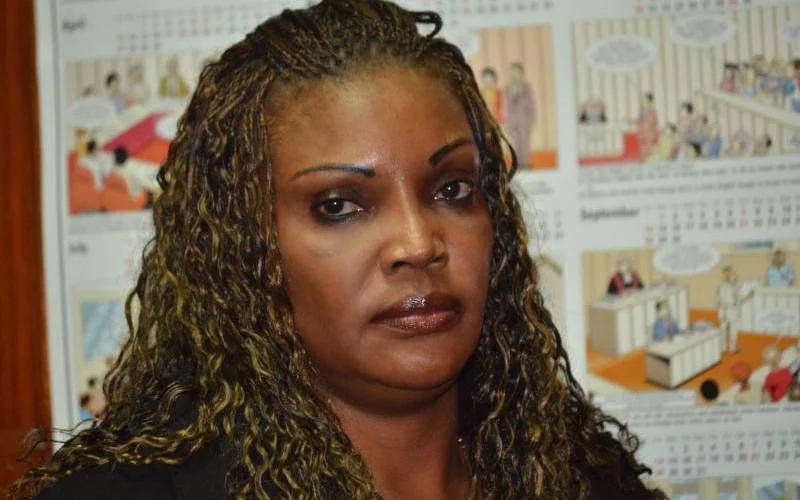
Their relationship was rocky, marked by numerous arrests on drug trafficking charges.
In 2013, Chinedu was deported from Kenya after authorities seized drugs in his
possession, a move that further exposed Akinyi to public scrutiny.
A HISTORY OF LEGAL TROUBLES
Over the years, Akinyi faced repeated allegations of drug trafficking. Her name became
prominent in 2008 when she was arrested in New Delhi, India, alongside former
Budalang’i MP Raphael Wanjala.
Authorities detained the pair with undeclared cash worth Sh7.59 million, suspected to
be linked to drug deals. Although released after intervention by the Kenyan government, the incident marked the start of a string of legal troubles for Akinyi.
In 2013, she and Wanjala were arrested again on the Nairobi-Namanga highway with a
suspicious white powder. Although they claimed it was corn flour, suspicions persisted,
and Akinyi’s criminal associations deepened.
THE TURNING POINT: CONVICTION FOR HERION SMUGGLING
Akinyi’s criminal activities reached a dramatic conclusion in 2019 when a police raid on
Deep West Resort uncovered 2kg of heroin worth Sh5 million hidden in a shoe rack.
The Anti-Narcotics Directorate linked the operation to an international smuggling
network coordinated by Akinyi.
The Jomo Kenyatta International Airport Tribunal found Akinyi guilty under Article
4(a) of the Narcotic Drugs and Psychotropic Substances Control Act, which
mandates life imprisonment for drug trafficking.
The court heard compelling evidence, including photographs of heroin wrapped in white
tape, voice recordings coordinating smuggling activities, and the discovery of a Tabita
Digital Scale used to weigh drugs.
Akinyi’s co-defendants, Paulin Kalala Musankinshay and Peres Adhiambo, were
similarly implicated. Evidence also revealed that Akinyi used multiple fake passports, including a Congolese passport in the names of “Mape Marline Kambura” and “Raha Eveline
Kambere,” enabling her to operate under different aliases.
FINANCIAL CRIMES AND ASSET RECOVERY
Beyond drug trafficking, Akinyi’s wealth came under scrutiny. In 2021, she lost two
luxury vehicles worth Sh20 million to the State, deemed proceeds of crime.
Investigations by the Asset Recovery Agency revealed that Akinyi deposited
suspiciously large sums ranging from Sh60,000 to Sh20 million into various bank
accounts. Her real estate investments—villas built and rented out—further indicated
illicit income sources.
THE END OF THE ROAD
On December 10, 2024, Akinyi faces sentencing, which could include life
imprisonment and a Sh5 million fine. Her fall from grace highlights the dangers of
unchecked ambition and illegal pursuits. Magistrate Njeri Thuku, who presided over the
case, dismissed Akinyi’s defence that the drugs were planted by her estranged husband
Chinedu, calling it baseless.
CONCLUSION
From her meteoric rise as a business mogul to her conviction as a drug trafficker, Joyce
Akinyi’s life is a cautionary tale of how power, wealth, and crime can intertwine.
Her story also underscores Kenya’s ongoing battle with drug trafficking and the far-reaching
consequences of organised crime. For Akinyi, the glitz and glamour of her former life
have now given way to the stark reality of justice.
Nb: Exchange rate 1 USD = 145 Ksh
The Entrepreneur
Miss Rwanda 2022, Divine Muheto, Faces Drink-Driving Scandal

: Miss Rwanda 2022, Divine Muheto, was arrested for drink-driving, fined, and
detained after a car crash. She expresses regret and seeks forgiveness for her
actions.
From Beauty Queen to Legal Controversy
Divine Muheto, 21, crowned Miss Rwanda 2022, rose to prominence as a symbol of
beauty and ambition. She always believed she had what it took to achieve her childhood
dream of becoming a beauty queen.
Her journey began after high school when she entered the Miss Rwanda competition,
ultimately claiming the coveted title.
Reflecting on her success, she once said, “When you fear, you can’t make anything
different in life, but when you are fearless, a lot of positive things come your way.”
Legal Troubles in 2024
However, her reign as Miss Rwanda has been overshadowed by controversy. In late
2024, Muheto was arrested following a drink-driving incident in Kigali.

Reports from the Rwanda National Police (RNP) confirmed that she was caught driving
under the influence of alcohol without a valid license, resulting in a crash that destroyed
public infrastructure, including a street light pole and palm trees.
The police also noted that Muheto fled the scene of the accident. She was subsequently
fined 190,000 Rwandan francs (approximately $140) and detained.
This incident marked a troubling pattern, as the beauty queen had previously faced
similar charges in September 2023, when she crashed her car into a building while
driving drunk.
Silent Remorse and Public Engagement
Muheto, the daughter of Assistant Commissioner of Police Francis Muheto, has
remained largely silent in the media following her arrest, though her legal team has
expressed that she deeply regrets her actions and has sought forgiveness.
Despite this, she continues to be a public figure, engaged in various activities. Her legal troubleshave raised concerns, but she remains resolute in her belief that life’s challenges present growth opportunities.

Inspirational Messages and Support System
While her parents have largely stayed out of the spotlight, Divine Muheto has continued
to inspire many young people in Rwanda, emphasising resilience and self-improvement.
She once said, “I knew I had what it takes to the last dot,” and even in the face of
adversity, she strives to move forward, learning from her mistakes and striving to make
a positive impact.
-

 Business & Money9 months ago
Business & Money9 months agoEquity Group Announces Kshs 15.1 Billion Dividend Amid Strong Performance
-

 Politics3 months ago
Politics3 months agoFred Okengo Matiang’i vs. President William Ruto: A 2027 Election Showdown
-

 Politics2 months ago
Politics2 months agoIchung’wah Faces Mt. Kenya Backlash Over Gachagua Impeachment Support
-

 Politics5 months ago
Politics5 months agoPresident Ruto’s Bold Cabinet Dismissal Sparks Hope for Change
-

 Politics5 months ago
Politics5 months agoKenya Grapples with Investor Confidence Crisis Amid Tax Protest Fallout
-

 Politics5 months ago
Politics5 months agoPresident Ruto’s Lavish Spending Amid Kenya’s Economic Struggles Sparks Outrage
-

 Politics4 months ago
Politics4 months agoJohn Mbadi Takes Over Kenya’s Treasury: Challenges Ahead
-

 Business & Money1 month ago
Business & Money1 month agoMeet Kariuki Ngari: Standard Chartered Bank’s new CEO of Africa. What’s Next?

